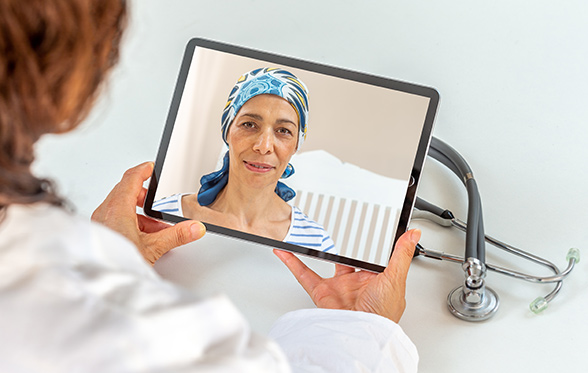
For your members who are in isolation and are having allergy symptoms, earaches, flu, or mental health issues, telemedicine may be the best option to seek medical help. Public health experts, doctors, and hospitals are encouraging telemedicine as the solution to keep patients safe and yet receive proper medical attention. For non-emergency ailments, consulting with a health care professional via computer, smartphone, or tablet is an easy and secure way for them to obtain treatment.
Most health plans, including Medicare Advantage plans, are expanding their benefits to include telemedicine services for their members.
Telemedicine provides members with access to healthcare providers through a live, online virtual visit, or by speaking on the phone. Studies show that telemedicine can help to lower hospital readmissions and reduce healthcare costs.
Commonly treated illnesses for telemedicine services include:
- Sinus infections
- Upper respiratory illnesses
- Conjunctivitis (pink eye)
- Rashes
- Adult asthma
- Seasonal allergies
- Common cold
- Flu
- Mental health issues
There are many advantages to members for telemedicine services:
- Telemedicine provides available care to those living in rural areas, and for those without transportation.
- High-quality care – studies show services delivered via telemedicine are as good as in traditional in-person consultations.
- Patients like convenience and are more likely to seek medical attention.
- Members can stay home and empowers them to play an active role in their healthcare.
For providers, there are also many benefits:
- Enables practices to reach more patients.
- Ability for providers to retain current patients
- Patient satisfaction at 90%.
- Reduce the cost of healthcare and increase efficiencies.
- Decreases no-shows and cancellations.
Chronic Care Benefits
Another large part of telemedicine is the use of home-monitoring devices and programs that can reduce health care costs and help to avoid hospital admissions. Telemedicine is an ideal way to monitor those with chronic conditions such as COPD, heart failure, and obesity. For example, telemedicine is useful to help those managing diabetes by allowing caregivers to monitor patients who use mobile medical equipment to collect data on things like blood pressure, blood sugar levels, etc.
One cost-effective way to ensure proper nutrition to those with diabetes and other chronic conditions is home-delivered meals. Older adults may have special dietary needs and need to eat regular, well-balanced meals.
To find out how home-delivered meals can help your members or patients, click the box below.








